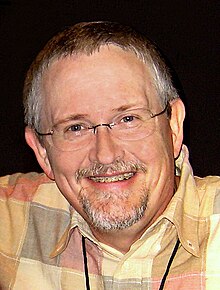Orson Scott Card
[1] Card teaches English at Southern Virginia University; he has written two books on creative writing and serves as a judge in the Writers of the Future contest.
He remains a practicing member of the LDS Church and Mormon fiction writers Stephenie Meyer, Brandon Sanderson, and Dave Wolverton have cited his works as a major influence.
The family moved to Santa Clara, California, when Card was six; they stayed there for seven years while his father completed his master's degree and worked as a professor at San Jose State College.
[14][12] After graduation, he started the Utah Valley Repertory Theatre Company, which for two summers produced plays at "the Castle", a Depression-era outdoor amphitheater.
[34] Card modeled Mikal's Songbird on Ender's Game, both of which include a child with special talents who goes through emotional turmoil when adults seek to exploit his ability.
[47] In October of that year, Tom Doherty offered a contract for Card's proposed Alvin Maker series, which allowed him to return to creative writing full-time.
[60] Inspired by Spenser's Faerie Queene, Card composed the long poem Prentice Alvin and the No-Good Plow, which uses colloquial language and diction common to Joseph Smith's time.
The poem, along with the novelette "Hatrack River",[61] became the basis for Seventh Son (1987), the first book in The Tales of Alvin Maker series, a fantasy retelling of the Joseph Smith story.
Card continued the Ender's Game series with Xenocide (1991) and Children of the Mind (1996), which focus on Jane, an artificial intelligence that develops self-awareness.
[84][85] Aaron Johnston and Card conceptualized the stories that make up the prequel to Ender's Game, realizing many of them would work best in novel format but first publishing the comics through Marvel.
[101] In the 1990s, Card contributed dialogue to the point-and-click adventure video games The Secret of Monkey Island, The Dig, and NeoHunter, an early first-person shooter.
The novels and game are about a near-future civil war in the United States that occurs after civilians resist a left-wing coup in the White House.
[108] He collaborated with his daughters Emily and Zina on the graphic novel Laddertop,[109][110] and with Aaron Johnston to write a series of six Dragon Age comics.
[127][128][129] On Rotten Tomatoes, the critical consensus states: "If it isn't quite as thought-provoking as the book, Ender's Game still manages to offer a commendable number of well-acted, solidly written sci-fi thrills.
[141] In 2014, Card stated that Isaac Asimov and Ray Bradbury were conscious influences on his writing, along with Early Modern English from the King James Version of the Bible and the works of William Shakespeare.
[144][145] Susanne Reid, a science fiction scholar,[146] stated Card's religious background is evident in his frequent messiah protagonists and the "moral seriousness" in his works.
[147][148] Card's science-fiction books do not reference the LDS religion directly but "offer careful readers insights that are compelling and moving in their religious intensity".
[149] Dick Butler criticized A Planet Called Treason for its lack of Gospel themes and ideas, and two other LDS reviewers defended Card.
[161] Because Card began his writing career in screenplays, his early work is considered accessible and fast-paced with good characters but stylistically unremarkable.
[165] The graphic violence in his early fiction was controversial; frequent appearances of naked men and boys raised "questions about homoerotic imagery", according to Westfahl.
[180] Collings states part of this story "could serve as an epigram of all Card's fictions; trapped within a circle of opposing forces, one focal character must decide whether or not to become, like Ender Wiggin, 'something of a savior, or a prophet, or at least a martyr' .
[165] The situations and choices in the Ender series invoke a number of philosophical topics, including the rules of war, embodiment psychology, the ethics of anthropology and xenology, and the morality of manipulating children.
[183] In a May 2013 essay called "Unlikely Events", which Card presented as an experiment in fiction writing,[184] Card described an alternative future in which President Barack Obama ruled as a "Hitler- or Stalin-style dictator" with his own national police force of young unemployed men; Obama and his wife Michelle would have amended the U.S. Constitution to allow presidents to remain in power for life, as in Nigeria, Zimbabwe, and Nazi Germany.
[194] At SFReviews, Thomas Wagner took further issue with Card's tendency to "smugly pretend ... to be above it all", or claiming to be moderate while espousing conservative views of news media.
Eugene England defends Zdorab, arguing that he is a sympathetic character who discovered that his homosexuality was determined by his mother's hormone levels during pregnancy.
[199][200] Trade journal Publishers Weekly criticized Card's work, stating its main purpose was to attempt to link homosexuality with pedophilia.
[201] Card responded that he did not link homosexuality with pedophilia, stating that in his book, Hamlet's father was a pedophile that shows no sexual attraction to adults of either sex.
Card also questioned in a 2004 column the notion that homosexuality was a purely innate or genetic trait and asserted that a range of environmental factors also contributed to its development, including abuse.
[214] However, in an introduction to a reprint of his essay, Card wrote that since 2003, when the U.S. Supreme Court had ruled those laws unconstitutional, he has "no interest in criminalizing homosexual acts".
[9] Eric James Stone, Jamie Ford, Brian McClellan, Mette Ivie Harrison and John Brown have attended Card's literary boot camp.

